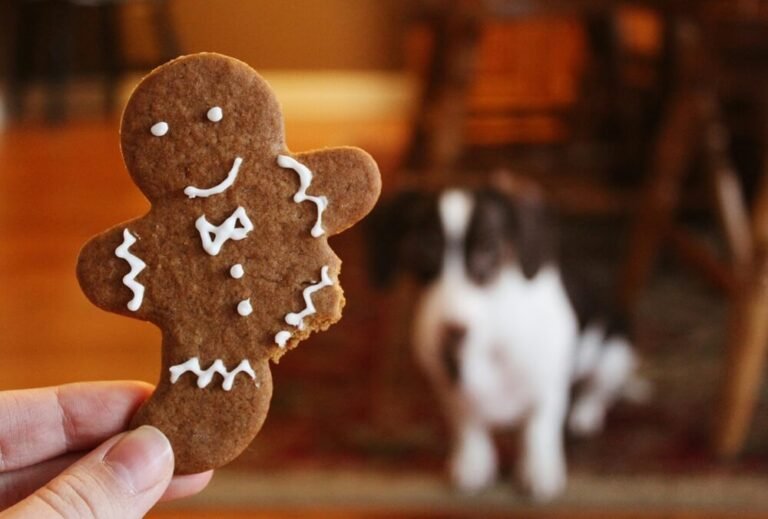Cinnamon is in everything—from your morning oatmeal to the scented candle on your kitchen counter. The precise figures for cinnamon consumption in UK is not readily available but UK is a significant importer and consumer of cinnamon within Europe. Cinnamon is widely used in British cuisine, especially in baked goods like biscuits and desserts, and also finds its way into beverages and savory dishes. We could be consuming cinnamon every day and often without a second thought. But what happens when your dog sneaks a lick of your cinnamon bun? Harmless curiosity or potential health risk? So can dogs eat cinnamon?
This question comes up more often than you’d think. As a veterinarian, I’ve seen concerned pet owners rush in after their dog devoured a pumpkin spice muffin or licked cinnamon powder off the floor. The good news? In most cases, cinnamon isn’t toxic to dogs. But that doesn’t mean it’s always safe, or smart to let them have it.
Let’s get clear on what matters. There’s a difference between a sprinkle of cinnamon in a treat and your dog inhaling a tablespoon of powdered spice. The dose, form, and context make all the difference. Plus, not all cinnamon is created equal.
In this article, we’ll break it all down: the science, the risks, the safe limits, and when to worry. You’ll leave knowing exactly when to call your vet, and when you can relax.
Because when it comes to your dog’s health, guessing isn’t good enough. Let’s dig in.
Technically, yes in small amounts, cinnamon is generally safe for dogs to eat. The ASPCA doesn’t list cinnamon as toxic to dogs, and most vets agree that a small sprinkle won’t cause harm. That said, “safe” doesn’t always mean “beneficial,” and the form and quantity are crucial.
What’s considered small? We’re talking:
More than that? You could run into problems like mouth irritation, low blood sugar, vomiting, or worse.
There are two main types of cinnamon:
Cassia cinnamon contains high levels of coumarin, a natural compound that can damage the liver in large doses. Ceylon cinnamon has much less of it and is considered the safer option if you do plan to share a tiny bit with your dog.
Quick tip: If you’re buying cinnamon for your dog’s homemade treats, go with Ceylon. It’s gentler, both in flavour and liver impact.
Let’s be clear: while a trace amount is likely fine, inhaling cinnamon powder, licking concentrated essential oils, or eating large amounts can cause serious health issues.Here are signs of cinnamon toxicity in dogs:
The biggest risk comes from cinnamon essential oils, which are far too potent for dogs. Just a few licks can irritate their mouths, upset their stomachs, or worse. These should never be given to dogs directly or applied to their skin.
While a plain, tiny piece of cinnamon toast might not cause problems, most baked goods are not dog-friendly. Here’s why:
Bottom line: If your dog eats a cinnamon roll off the counter, check the ingredients. If it contains nutmeg, xylitol, or raisins (another serious toxin), call your vet immediately.
In controlled doses, some studies suggest that Ceylon cinnamon may offer modest health benefits:
However, these studies are mostly in lab animals or humans, not dogs. If you’re considering cinnamon as a supplement for a dog with arthritis or diabetes, talk to your vet first. They may recommend safer, better-studied options.
If you’d like to let your dog enjoy a hint of cinnamon, here’s how to do it safely:
Avoid anything with sugar, spice blends, or essential oils. Stick with whole food-based, vet-approved treats.
If your dog managed to consume a large amount of cinnamon, especially powder or essential oil, call your veterinarian or an emergency clinic immediately. Here’s what to look for:
While cinnamon poisoning is rarely fatal, early intervention can prevent serious complications.
Cinnamon isn’t toxic to dogs but it’s not entirely harmless either. A small sprinkle of Ceylon cinnamon in a homemade treat? Fine. A mouthful of powdered spice or a bite of cinnamon essential oil? Big problem.
When in doubt, keep it simple. Dogs don’t need cinnamon to thrive. They need balanced, species-appropriate food, love, and a safe environment. If you want to offer variety in their diet, stick with proven dog-safe ingredients, and always double-check with your vet.
